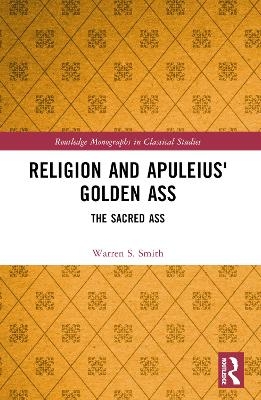
Religion and Apuleius' Golden Ass
The Sacred Ass
Seiten
2024
Routledge (Verlag)
978-1-032-19282-6 (ISBN)
Routledge (Verlag)
978-1-032-19282-6 (ISBN)
This volume examines Apuleius’ The Golden Ass within the context of the popular beliefs and Jewish and Christian writings that were part of the intellectual culture of 2nd century C.E. North Africa. Suitable for those studying Apuleius, Roman literature, and Christian and Jewish literature and beliefs of this period.
This volume examines Apuleius’ comic donkey novel, The Golden Ass, within the context of the popular beliefs and Jewish and Christian writings that were part of the intellectual culture of his own day in 2nd century C.E. North Africa, a culture which can also be glimpsed in some early Arabic writings.
The novel was written against a cultural and religious background in which the donkey had various connotations, both positive and negative, but tended to be admired in Jewish, Christian, and later, in Muslim writings. Smith explores the influence of such popular opinions on The Golden Ass and how Apuleius presented Isis and Osiris as desirable alternatives to the claims of both Christianity and magic, offering hope of spiritual renewal partly modelled on contemporary religious apocalyptic literature. Complemented by images of contemporary art, including amulets and terra cotta figures, this volume gives readers a better understanding of how Apuleius, ostensibly a Platonist and member of the Roman establishment, could maintain an intellectual independence in a North African milieu while still drawing on hope in the salvation of the gods.
Religion and Apuleius’ Golden Ass provides a fascinating new approach to this much disputed novel, of interest not only to students and scholars of Apuleius and Roman literature, but also scholars interested in Christian and Jewish literature and beliefs of the early centuries of the first millennium C.E.
This volume examines Apuleius’ comic donkey novel, The Golden Ass, within the context of the popular beliefs and Jewish and Christian writings that were part of the intellectual culture of his own day in 2nd century C.E. North Africa, a culture which can also be glimpsed in some early Arabic writings.
The novel was written against a cultural and religious background in which the donkey had various connotations, both positive and negative, but tended to be admired in Jewish, Christian, and later, in Muslim writings. Smith explores the influence of such popular opinions on The Golden Ass and how Apuleius presented Isis and Osiris as desirable alternatives to the claims of both Christianity and magic, offering hope of spiritual renewal partly modelled on contemporary religious apocalyptic literature. Complemented by images of contemporary art, including amulets and terra cotta figures, this volume gives readers a better understanding of how Apuleius, ostensibly a Platonist and member of the Roman establishment, could maintain an intellectual independence in a North African milieu while still drawing on hope in the salvation of the gods.
Religion and Apuleius’ Golden Ass provides a fascinating new approach to this much disputed novel, of interest not only to students and scholars of Apuleius and Roman literature, but also scholars interested in Christian and Jewish literature and beliefs of the early centuries of the first millennium C.E.
Warren S. Smith is Professor Emeritus of Classics at the University of New Mexico, Albuquerque, USA, and has also taught in Kenya and the Philippines. He has edited Erasmus’ Annotations on Romans and Satiric Advice on Women and Marriage From Plautus to Chaucer.
1. Asinine Thinking; 2. Magical Thinking: The Witchcraft Narrative; 3. Fortune Competes With Providence: The Meaning of Laughter; 4. Robbers Think Like Heroes; 5. Cupid and Psyche: Thinking Like A Winged Creature; 6. Thinking Like A Christian Apologist; 7. Is the Golden Ass a God?; 8. Thinking Like A Christian; 9. Christian and Jewish Apocalyptic Writings; 10. Balancing Judaism and Christianity; Appendix: Lucius ‘Becomes’ Apuleius.
| Erscheinungsdatum | 11.09.2024 |
|---|---|
| Reihe/Serie | Routledge Monographs in Classical Studies |
| Zusatzinfo | 12 Halftones, black and white; 12 Illustrations, black and white |
| Verlagsort | London |
| Sprache | englisch |
| Maße | 156 x 234 mm |
| Gewicht | 385 g |
| Themenwelt | Literatur ► Klassiker / Moderne Klassiker |
| Geschichte ► Allgemeine Geschichte ► Altertum / Antike | |
| Geisteswissenschaften ► Religion / Theologie ► Weitere Religionen | |
| ISBN-10 | 1-032-19282-8 / 1032192828 |
| ISBN-13 | 978-1-032-19282-6 / 9781032192826 |
| Zustand | Neuware |
| Informationen gemäß Produktsicherheitsverordnung (GPSR) | |
| Haben Sie eine Frage zum Produkt? |
Mehr entdecken
aus dem Bereich
aus dem Bereich


